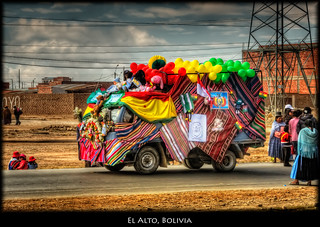Adopting from Bolivia
Notice: As of July 14, 2014, all individuals and agencies facilitating international adoptions must be in compliance with the Intercountry Universal Accreditation Act.
The information contained on this website is for educational purposes only and is not intended to be a substitute for professional legal advice. Always seek the advice of a licensed and qualified professional. While the content of this website is frequently updated, information changes rapidly and therefore, some information may be out of date, and/or contain inaccuracies, omissions or typographical errors.
Contents
About Bolivia
Bolivia, named after independence fighter Simon BOLIVAR, broke away from Spanish rule in 1825; much of its subsequent history has consisted of a series of nearly 200 coups and countercoups. To learn more, read About Bolivia.
Bolivia Adoption Alert
There have been numerous adoption alerts posted for Bolivia. To learn more, read Bolivia Adoption Alert.
Hague Convention Information
Bolivia is party to the Hague Convention on Protection of Children and Co-operation in Respect of Intercountry Adoption (Hague Adoption Convention). Therefore all adoptions between Bolivia and the United States must meet the requirements of the Convention and U.S. law implementing the Convention. Read more about Bolivia and the Hague Convention.
Who Can Adopt
Adoption between the United States and Bolivia is governed by the Hague Adoption Convention. Therefore to adopt from Bolivia, you must first be found eligible to adopt by the U.S. Government. The U.S. Government agency responsible for making this determination is the Department of Homeland Security, U.S. Citizenship and Immigration Services (USCIS). To learn more, read about Who Can Adopt from Bolivia.
Who Can Be Adopted
Because Bolivia is party to the Hague Adoption Convention, children from Bolivia must meet the requirements of the Convention in order to be eligible for adoption. For example, the Convention requires that Bolivia attempt to place a child with a family in-country before determining that a child is eligible for intercountry adoption. In addition to Bolivia's requirements, a child must meet the definition of a Convention adoptee for you to bring him or her back to the United States. To learn more, read about Who Can Be Adopted from Bolivia
How to Adopt
Because Bolivia is party to the Hague Adoption Convention, adopting from Bolivia must follow a specific process designed to meet the Convention's requirements. A brief summary of the Convention adoption process is given below. You must complete these steps in the following order so that your adoption meets all necessary legal requirements. Read about How to Adopt from Bolivia.
Traveling Abroad
Applying for Your U.S. Passport
A valid U.S. passport is required to enter and leave Bolivia. Only the U.S. Department of State has the authority to grant, issue, or verify U.S. passports. Read more about Traveling Abroad in Bolivia
After Adoption
What does Bolivia require of the adoptive parents after the adoption?
We strongly urge you to comply with the wish of Bolivia and complete all post-adoption requirements in a timely manner. Your adoption agency may be able to help you with this process. Your cooperation will contribute to that country's history of positive experiences with American parents.
What resources are available to assist families after the adoption?
Many adoptive parents find it important to find support after the adoption. Take advantage of all the resources available to your family -- whether it's another adoptive family, a support group, an advocacy organization, or your religious or community services.
Here is a good place to start your support group search:
North American Council on Adoptable Children
NOTE: Inclusion of non-U.S. Government links does not imply endorsement of contents.
Contact Information
U.S. Embassy in Bolivia
American Embassy - Consular Section Avenida Arce 2780, between calles Cordero and Campos La Paz, Bolivia
Av. 16 de Julio #1219 La Paz, Bolivia Telephone: 591 - 2 - 212 4725; 591- 2 -212 4727 Email: vicejunite@alamo.entelnet.bo
Embassy of Bolivia in the United States
3014 Massachusetts Ave., N.W. Washington, D.C. 20008 Tel: (202) 483-4410
Bolivia also has Consulates General in Houston, Miami, New York, Oklahoma City and Seattle.
Office of Children's Issues
U.S. Department of State CA/OCS/CI SA-17, 9th Floor Washington, DC 20522-1709 Tel: 1-888-407-4747 E-mail: AskCI@state.gov Internet: U.S. Department of State
U.S. Citizenship and Immigration Services (USCIS)
For questions about immigration procedures, call the National Customer Service Center (NCSC). 1-800-375-5283 (TTY 1-800-767-1833)
SOURCE
Intercountry Adoption, Bureau of Consular Affairs. U.S. Department of State Country Information[1]







